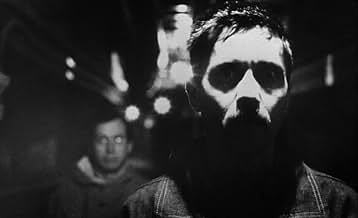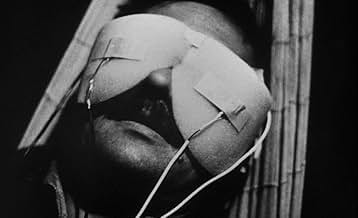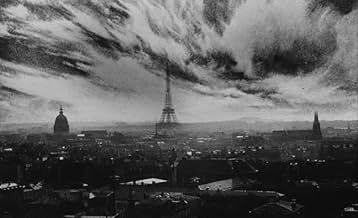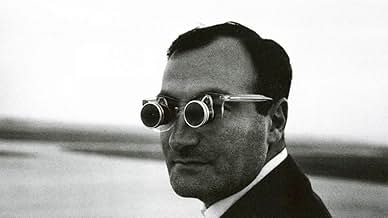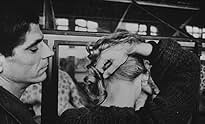AVALIAÇÃO DA IMDb
8,2/10
39 mil
SUA AVALIAÇÃO
A história de um homem forçado a explorar suas memórias após a devastação da Terceira Guerra Mundial, contada por meio de imagens estáticas.A história de um homem forçado a explorar suas memórias após a devastação da Terceira Guerra Mundial, contada por meio de imagens estáticas.A história de um homem forçado a explorar suas memórias após a devastação da Terceira Guerra Mundial, contada por meio de imagens estáticas.
- Prêmios
- 2 vitórias no total
Jean Négroni
- Narrator
- (narração)
- (as Jean Negroni)
Ligia Branice
- A woman from the future
- (as Ligia Borowcyk)
William Klein
- A man from the future
- (as Bill Klein)
James Kirk
- Narrator
- (English version)
- (narração)
Avaliações em destaque
10tsmiljan
If you can find this rare film, you must see it. Unique in film history, this experimental short film consists of a series of still shots tied together by narration. It is the story of a post-apocalyptic Earth and time travel. Each still shot is a work of art, and the plot is compelling. A man with a strong memory of a past event witnessed as a small child (a person being shot at an airport), is periodically sent back into that pre-war period by "experimenters" with devious purposes. While visiting the past, the hero falls in love with a woman from that past.
Watch for the one and only scene that contains any movement and natural sounds (birds in the background, while the woman wakes up next to her lover). Coming in the midst of the relentless still shots, it is one of the most sublime moments in all cinema. You are doing yourself a disservice if you do not see this film.
Watch for the one and only scene that contains any movement and natural sounds (birds in the background, while the woman wakes up next to her lover). Coming in the midst of the relentless still shots, it is one of the most sublime moments in all cinema. You are doing yourself a disservice if you do not see this film.
'La Jetee' is a film about movement made up entirely of photographic stills. Well, not entirely. For one transcendent moment the photo moves, ironically at the film's stillest moment, as a woman we have starred at sleeping in the sunny dawn wakes up. It is typical of Marker that a film spanning centuries, millenia, war, torture, experimentation, murder, dreams, time travel, destruction, love, joy, should have as its epiphanical moment an elusive, delusive moment of utter calm, that of a sleeping woman opening her eyes. In a film whose body is the stuff dreams are made on, such a moment is truly cataclysmic.
Like all Marker's masterpieces, 'Jetee', ostensibly a work of science-fiction, is profoundly concerned with Time, Memory and History. Such abstracts treated in lesser hands have a tendency to become vague, airy, removed from life; but Marker, the old leftist, always grounds his philosophy, humanisises and politicises it.
'Jetee', though a short, is rich with ambiguity and irony - the freedom of dreams, to reinvent the past, to escape from circumstances, is exploited by a totalitarian oligarchy, and ultimately fatal for the dreamer. Such is our desperate need to dream, to escape, forget/reinvent, that it is easy to forget that the Man's relationship with the Woman is a phantom, an entire history blown out of a brief glimpse, like that Baudelaire poem where he is stunned by a brief glimpse of a woman he never sees again.
It is this act the tyrants need, this gesture of recreation - by embodying what never happened, by making real or factual what is ultimately desire, he has destroyed history; this paves the way for the vision of 3000, where history is destroyed, and along with it humanity; a Houhnyhm-land of disembodied intelligence. This idea of the death of history, of the victory of post-modernity, would be most eloquently in Marker's chef d'oeuvre, 'Sans Soleil', which was shown with this film at the screening I attended.
But Marker's great achievement here is his creation of the future as a regression, as a descent into medievalism, part-Les Miserables, part-Occupation, with all the signs of French progress and pretension destroyed, with all Haussman's modernity and prosperity run to earth by nuclear contamination, the survivors living in sewers with rats, as their ancestors once did.
Marker's vision is terrifying in its mixture of ruined symmetry and a sickening moral blackness, the general silence punctuated by impenetrable whispers and noises - this is one of the most frightening soundtracks I've ever heard. This medievalism also means a bypassing of the intellect, of literal Enlightenment, and back to a kind of spiritual murk, with pastiche sacred music flooding the film, and parodies of religious kitsch obtruding (the godlike light seeping into dense interiors; religious slogans; the compositions of survivors like beatified saints) on the relics of civilisation, the graffiti, the now-impenetrable codes.
This chaos is contrasted with the Paris of the dream, especially in the museum scene, even more chilling with its statues looking like petrified relics from a volcanic disaster; the mute, stuffed animals warning humans of their fate; the exquisite composition of architecture, trapping the couple in a web of order, boxes, classification, obsolescence, the doomed attempts by mankind to order the universe.
yet this dream is so moving because it offers love, connection, gardens, talk, dreams, Paris, even if they are illusory. because, although this is a dense, difficult, allusive, modern film, it also illuminates a simple, ancient truth 'In the midst of life, we are in death'. As Morrissey once responded, 'Etcetera'.
Like all Marker's masterpieces, 'Jetee', ostensibly a work of science-fiction, is profoundly concerned with Time, Memory and History. Such abstracts treated in lesser hands have a tendency to become vague, airy, removed from life; but Marker, the old leftist, always grounds his philosophy, humanisises and politicises it.
'Jetee', though a short, is rich with ambiguity and irony - the freedom of dreams, to reinvent the past, to escape from circumstances, is exploited by a totalitarian oligarchy, and ultimately fatal for the dreamer. Such is our desperate need to dream, to escape, forget/reinvent, that it is easy to forget that the Man's relationship with the Woman is a phantom, an entire history blown out of a brief glimpse, like that Baudelaire poem where he is stunned by a brief glimpse of a woman he never sees again.
It is this act the tyrants need, this gesture of recreation - by embodying what never happened, by making real or factual what is ultimately desire, he has destroyed history; this paves the way for the vision of 3000, where history is destroyed, and along with it humanity; a Houhnyhm-land of disembodied intelligence. This idea of the death of history, of the victory of post-modernity, would be most eloquently in Marker's chef d'oeuvre, 'Sans Soleil', which was shown with this film at the screening I attended.
But Marker's great achievement here is his creation of the future as a regression, as a descent into medievalism, part-Les Miserables, part-Occupation, with all the signs of French progress and pretension destroyed, with all Haussman's modernity and prosperity run to earth by nuclear contamination, the survivors living in sewers with rats, as their ancestors once did.
Marker's vision is terrifying in its mixture of ruined symmetry and a sickening moral blackness, the general silence punctuated by impenetrable whispers and noises - this is one of the most frightening soundtracks I've ever heard. This medievalism also means a bypassing of the intellect, of literal Enlightenment, and back to a kind of spiritual murk, with pastiche sacred music flooding the film, and parodies of religious kitsch obtruding (the godlike light seeping into dense interiors; religious slogans; the compositions of survivors like beatified saints) on the relics of civilisation, the graffiti, the now-impenetrable codes.
This chaos is contrasted with the Paris of the dream, especially in the museum scene, even more chilling with its statues looking like petrified relics from a volcanic disaster; the mute, stuffed animals warning humans of their fate; the exquisite composition of architecture, trapping the couple in a web of order, boxes, classification, obsolescence, the doomed attempts by mankind to order the universe.
yet this dream is so moving because it offers love, connection, gardens, talk, dreams, Paris, even if they are illusory. because, although this is a dense, difficult, allusive, modern film, it also illuminates a simple, ancient truth 'In the midst of life, we are in death'. As Morrissey once responded, 'Etcetera'.
In 1995, Terry Gilliam made one of the finest movies in the nineties: "Twelve Monkeys". To explain how he made this awesome movie, he openly declared that he drew his inspiration from a French short film: "La Jetée". It is true that the 2 opus have similarities: both present a devastated earth caused by man's madness, survivors who take refuge in underground rooms and try to improve their grueling living conditions and especially both feature a jaded and manipulated main character.
A short film that is a reflection about time, happiness and love, entirely composed of static shots, "la jetée" is a powerful and mesmerizing work and it may appear as a cornerstone in French cinema. 42 years after its release, it kept all its strength and has not aged a bit. The quality of the editing, the photography and the commentary add to the success of Chris Marker's work.
Highly recommended and the influence of Chris Marker's short film on "Twelve Monkeys" shows well a thing: French cinema inspired a great number of American movies.
A short film that is a reflection about time, happiness and love, entirely composed of static shots, "la jetée" is a powerful and mesmerizing work and it may appear as a cornerstone in French cinema. 42 years after its release, it kept all its strength and has not aged a bit. The quality of the editing, the photography and the commentary add to the success of Chris Marker's work.
Highly recommended and the influence of Chris Marker's short film on "Twelve Monkeys" shows well a thing: French cinema inspired a great number of American movies.
10rclusso
I first saw "La Jetee" in an introductory journalism class in the spring of 1973. The class was large, so large, in fact, that it was held in an auditorium rather than a conventional classroom. But when the film ended, there was about 30 seconds of stone-silence before the murmuring began. I sat slack-jawed and stunned and looked at Mary Ann, a girl who sat next to me and who I was slowly becoming friends with, to check her reaction. She looked equally stunned.
Thirty years have passed and I have occasionally revisited that moment. Despite wanting to know Mary Ann better, I was too timid and never saw her again after that semester ended and despite being stunned by the film, for some reason, I had lost track of its title. All I remembered was a haunting scene at an airport with a guy wearing glasses. That was it.
Just the other day and for no reason at all, I remembered the title "La Jetee" out of the blue. The name just popped into my head. And, even stranger, when I was checking the TV listings earlier today, I found that "La Jetee" was being shown on the Sundance Channel later.
I just finished watching it and I am as slack-jawed and stunned as I was thirty years ago. I guess the next logical thing will be to hear from Mary Ann. Just so long as I don't have to meet her at the airport.
Thirty years have passed and I have occasionally revisited that moment. Despite wanting to know Mary Ann better, I was too timid and never saw her again after that semester ended and despite being stunned by the film, for some reason, I had lost track of its title. All I remembered was a haunting scene at an airport with a guy wearing glasses. That was it.
Just the other day and for no reason at all, I remembered the title "La Jetee" out of the blue. The name just popped into my head. And, even stranger, when I was checking the TV listings earlier today, I found that "La Jetee" was being shown on the Sundance Channel later.
I just finished watching it and I am as slack-jawed and stunned as I was thirty years ago. I guess the next logical thing will be to hear from Mary Ann. Just so long as I don't have to meet her at the airport.
La Jettée (1962) is not only the most important work of science-fiction cinema since Fritz Lang's masterwork Metropolis (1927), but is also one of the most staggering achievements in the entire history of film. Here, filmmaker Chris Marker presents the audience with the ultimate cinematic dystopia; a futuristic, industrialised landscape of underground tunnels, colourless streets and jarring 60's architecture. The results are beautiful yet somewhat anachronistic, as the filmmaker employs a similar approach to that of Godard in Alphaville (1965) - or more recently, Winterbottom's Code 46 (2003) - albeit, with a less straightforward attitude to plot and ideology.
The basic narrative outline of the film is built around various reflective layers - similar to what Tarkovsky would use in his later film, Mirror (1975) - which allow Marker to create a certain feeling of mirroring between the notions of fact and fiction, life and death, reality and fantasy and so on. This, in turn, further develops the characters and the world of which they inhabit. The reason the film works without becoming a cold, lifeless lecture is because it anchors the images of nuclear holocaust and scientific exploration within humanistic characters and a sense of unashamed romanticism. But this is only one part of an elaborate puzzle; lest we forget that we are dealing with certain narrative paradoxes, not to mention an assortment of linear and non-linear story elements each unfolding simultaneously. Just when we think we've got the whole film worked out, our perspectives immediately change, and our ideas are lost in the blink of an eye.
However, aside from thematic visual palindromes, what is most remarkable about La Jettée - and the reason it has retained its reputation as a work of genius - is the way in which Marker manages to relate his story of travel and movement through the use of still images. By presenting these pictures to us in a sort of photo-montage - complete with brooding voice-over and various sound effects - the director somehow manages to bring the stillness of his film miraculously to life. It is, without question, a work of pure, unadulterated imagination, and a staggering testament to Marker's genius ability to convey a multitude of feelings, ideas and emotions, through a series of simple, static, though nonetheless, deeply evocative images.
The basic narrative outline of the film is built around various reflective layers - similar to what Tarkovsky would use in his later film, Mirror (1975) - which allow Marker to create a certain feeling of mirroring between the notions of fact and fiction, life and death, reality and fantasy and so on. This, in turn, further develops the characters and the world of which they inhabit. The reason the film works without becoming a cold, lifeless lecture is because it anchors the images of nuclear holocaust and scientific exploration within humanistic characters and a sense of unashamed romanticism. But this is only one part of an elaborate puzzle; lest we forget that we are dealing with certain narrative paradoxes, not to mention an assortment of linear and non-linear story elements each unfolding simultaneously. Just when we think we've got the whole film worked out, our perspectives immediately change, and our ideas are lost in the blink of an eye.
However, aside from thematic visual palindromes, what is most remarkable about La Jettée - and the reason it has retained its reputation as a work of genius - is the way in which Marker manages to relate his story of travel and movement through the use of still images. By presenting these pictures to us in a sort of photo-montage - complete with brooding voice-over and various sound effects - the director somehow manages to bring the stillness of his film miraculously to life. It is, without question, a work of pure, unadulterated imagination, and a staggering testament to Marker's genius ability to convey a multitude of feelings, ideas and emotions, through a series of simple, static, though nonetheless, deeply evocative images.
Você sabia?
- CuriosidadesThis short film was the inspiration for the Terry Gilliam film Os 12 Macacos (1995).
- Cenas durante ou pós-créditosThe opening credits do not describe it as a film, but as "un photo-roman".
- ConexõesEdited into The Hamster Factor and Other Tales of Twelve Monkeys (1996)
Principais escolhas
Faça login para avaliar e ver a lista de recomendações personalizadas
Detalhes
- Tempo de duração
- 28 min
- Cor
- Mixagem de som
- Proporção
- 1.66 : 1
Contribua para esta página
Sugerir uma alteração ou adicionar conteúdo ausente

